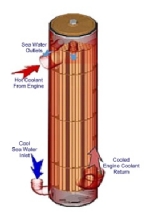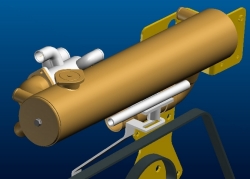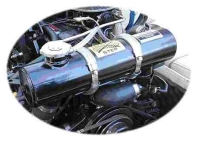25% OFF SALE - Fresh Water Closed Cooling Systems for Mercruiser, OMC and Volvo Penta
Products
*SALE* - Closed Cooling Systems by Monitor Products
- C12200 Copper Construction.
- High Capacity Tube Bundle (higher tube-count than standard).
- 6 Raw Water passes which yields higher water velocities, higher film coefficients, and therefore higher overall efficiencies.
- Knife edged dividers for reduced leakage.
- Dual Action Thermostat which allows maximized coolant flow during the entire engine operating range, regardless of thermostat position.
- Full flow coolant flow strategy which means thermostat bypassing is not utilized thereby ensuring full coolant flow thru the exhaust system as well as desirable operating temperatures when idling in cold water conditions.
- 160 Degree operating temperature for maximized spark & fueling by the engine management system.
Advantages of Monitor Closed Cooling Systems
Prevent Overheating & Extend the Life of Your Engine
After spending more than 20 years designing Fresh Water Cooling Systems at MerCruiser, Performance Product Technologies has an in-depth understanding of what makes a good engine Closed Cooling System function properly. Regular maintenance and servicing of any closed loop cooling system is an effective way of preventing engine damage from overheating, extending the life of your engine by preventing the need to have salt water circulating through your engine. But what you may not know is that a Fresh Water Cooling System from Monitor products can extend your Boating Season because it allows Boaters to utilize their boat into the winter months without worrying about freeze damage to the engine or Marine exhaust system. PPT offers a variety of affordable fresh water cooling systems. We offer systems from Monitor Products. We also offer OEM Mercruiser Closed Cooling Systems (Read More) as well. We offer unmatched expertise assisting customers determine the best option for your marine engine, as well offering useful tips and advice on proper installation. Closed Cooling Systems can vary in difficulty of installation based on the Boat Manufacturer and arrangement of your engine compartment.
The Benefits of a Closed (Fresh Water) Cooling System
 |
 |
 |
Q: What is Fresh-Water Cooling?
A: It is the marine version of the cooling system in your car. Most marine engines are converted from a non-marine engine that was designed to have clean non-corrosive antifreeze coolant circulating between the engine and a "radiator". The marine version of this cooling system is called Fresh-Water Cooling, and the radiator is called a Heat Exchanger. Raw (sea) water instead of air passes through the heat exchanger and absorbs the heat from the engine.
Many marine engines use the initially less expensive, Raw-Water-cooling system rather than Fresh Water Cooling. In this case, polluted corrosive seawater is pumped directly into the engine. The Raw-Water eats at the very base of a marine engine causing irreparable damage.
Q: What is the difference between a Fresh Water Cooling System and a Closed Cooling System?
A: Nothing it's just different terminology. Both terms are used to describe this type of cooling system
Q: What benefits will I get from Fresh Water Cooling?
A: There are several important benefits to Consider:
LONGER ENGINE LIFE
PROPER ENGINE TEMPERATURE
For best engine life and performance your car engine operates at a temperature much higher than a Raw-Water cooled marine engine. By converting to Fresh Water Cooling, you can bring the engine temperature up to its designed operating temperature. This, in turn, will give you:
SIMPLIFIED WINTERIZING
Extended Boating Season
EASY GALLEY WATER AND CABIN HEAT - Galley water heaters and cabin heaters utilizing excess engine heat are easily added to a PPT/MONITOR Fresh Water Cooling system.
Q: Should I have Fresh Water Cooling if I keep my boat in fresh-water?A: Yes, to simplify winterizing, eliminate all corrosion and debris damage, and maintain proper engine temperature. Although lake and river water is not as harmful as seawater, it contains salts, pollutants, mud, sand, and marine organisms, which can be damaging to an engine.
Q: I will probably sell my boat before I have any problems, why should I convert to Fresh Water Cooling?A: The trade-in value of a boat with Fresh Water Cooling is much higher. A Fresh Water Cooling system is the best way to defuse the time bomb that a Raw-Water cooled engine represents to a potential buyer. Raw-water corrosion damage is completely hidden and impossible to measure. A Fresh Water Cooling system suggests that there are no unpleasant surprises waiting. Fresh Water Cooling also suggests that you are knowledgeable and took good care of the engine.
Q: My engine is several years old. Does it make sense to convert to Fresh Water Cooling?A: Definitely. By installing Fresh Water Cooling on an older engine, you will prevent continued damage and you will enjoy all the other benefits from Fresh Water Cooling. Check out the following article to read more about installing a closed system onto an older engine...(Read More)
Q: How much longer will Fresh Water Cooling engines last?A: It is impossible to say. Water conditions and, therefore, Raw-Water corrosion rates vary from one location to the next. Since Raw-Water damage is internal and completely hidden, there is no accurate way to measure it and predict when the engine is going to fail. With an average of no more than 50 hours annually on pleasure boats, an engine that is Fresh Water Cooling and well maintained should last decades rather than years.
Q: How can I get galley water heat and/or cabin heat through Fresh Water Cooling?A: It is a simple addition. A Fresh Water Cooling marine engine provides heat in the same way as your car engine. A full range of galley water heaters and cabin air heaters can be installed with an easy do-it-yourself plumbing job.
Q: Why do some boat dealers say that Fresh Water Cooling is not necessary?A: It depends on what you mean by necessary. Fresh Water Cooling is not necessary in the short-term. Neither is changing your oil and filter and many other things that give your engine maximum life and performance. The benefits of Fresh Water Cooling are long-term. In order to keep the cost of a new boat down, some dealers hesitate to recommend options that are not immediately necessary.
Q: Why isn't Fresh Water Cooling standard from the engine manufacturer?A: It is simply a matter of cost. The small boat building business is very cost competitive. Most small boat builders, to keep costs down, specify less expensive Raw-Water cooled engines. Improvements such as Fresh Water Cooling are usually left to the owner's option.
Q: I thought that Fresh Water Cooling was primarily for larger boats.A: Fresh Water Cooling is for larger AND smaller boats. Factory Fresh Water Cooling engines are usually installed in larger, more expensive boats. The additional cost is low in proportion to the total cost of the boat.
In smaller boats, the engine represents a far larger proportion of the boat's total value. The owner therefore should be more concerned with the condition and value of his engine, or he will pay for it in the long run in the form of premature re-powering or lack of resale value.
Q: Are there different types of Fresh Water Cooling Systems Available?A: PPT/MONITOR systems come in two configurations. Using the following cooling system information you can make a comparison before making your purchasing decision. Select the following link to Read More on the: 1/2 System versus Full System Comparison
FULL SYSTEMS COOL THE BLOCK AND MANIFOLD. In full systems, the engine block and the exhaust manifolds are included in the antifreeze system. The exhaust elbows, where the Raw-Water exits through the exhaust system, always remain on the Raw-Water side.
Full systems may not be possible on all engines due to lack of proper water connections on the exhaust manifolds and lack of Raw-Water pump capacity.
Typically, full systems are more expensive in terms of hardware and installation.
HALF SYSTEMS COOL ONLY THE BLOCK. In half systems, the most expensive part of the engine, the block is on the antifreeze system. Exhaust manifolds remain on the Raw-Water side. When replacement manifolds are available at a reasonable cost, half systems are often the most cost effective.
Half systems are typically less expensive to buy and much easier to install.
Q: Will Fresh Water Cooling affect the basic engine warranty?A: There is no reason why it should. There is nothing in a PPT/MONITOR Fresh Water Cooling system that can do harm to the engine as long as the system is functioning normally. Because of our engineered high performance design, our systems have a very high cooling safety margin.
Q: Why choose a PPT/MONITOR Fresh Water Cooling system?A: There are several reasons to consider before making your cooling system purchase:
- FWC Basics...
- FWC Maintenance...
- FWC Trouble Shooting...
- FWC 1/2 System Vs. Full System...
